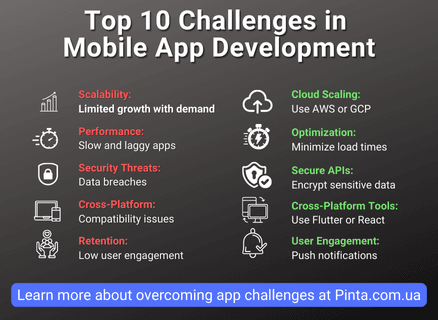Mobile app development
Cross-platform development
Performance optimization
Security practices
UI/UX Design
Agile development
UI testing
Top 10 Challenges in Mobile App Development and How to Overcome Them
Iliya Timohin
2024-12-20
In the fast-paced world of technology, mobile app development presents a unique set of challenges for developers and businesses alike. From ensuring scalability to optimizing performance, navigating security threats, and achieving cross-platform compatibility, the road to creating a successful mobile app is fraught with obstacles. However, with the right strategies and insights, these challenges can be effectively managed. In this article, we explore the top 10 challenges in mobile app development and provide actionable solutions to overcome them.

1. Scalability: Building Apps That Grow with Your Business
As businesses grow, their mobile applications must scale seamlessly to handle increased user demands and data loads. Scalability is crucial for maintaining app performance and user satisfaction.
Solution:
- Design your app architecture with scalability in mind from the outset. Use cloud services like AWS or Google Cloud to dynamically scale resources.
- Implement microservices architecture to facilitate independent scaling of different app components.
- Regularly test app performance under various load scenarios to identify and address potential bottlenecks before they impact users.
2. Performance Optimization: Ensuring Speed and Responsiveness
Users expect mobile apps to be fast and responsive. Slow load times and laggy interfaces can lead to poor user experiences and high uninstall rates.
Solution:
- Optimize app code and assets to reduce load times. Minimize the use of heavy graphics and animations.
- Utilize caching strategies to store frequently accessed data locally.
- Regularly monitor app performance using tools like Firebase Performance Monitoring to identify and fix issues promptly.
3. Navigating Security Threats in Mobile App Development
Security is a top concern in mobile app development, with threats ranging from data breaches to unauthorized access and malware.
Solution:
- Implement robust security practices such as encryption of sensitive data, secure API communications, and regular security audits.
- Use authentication mechanisms like OAuth or two-factor authentication to enhance user security.
- Keep your app updated with the latest security patches and educate users on security best practices.
4. Cross-Platform Compatibility: Building Apps That Work Everywhere
Developing apps that run smoothly on multiple platforms (iOS, Android, etc.) is a significant challenge due to varying device specifications and operating system requirements.
Solution:
- Leverage cross-platform development frameworks such as React Native, Flutter, or Xamarin to write code that works across multiple platforms.
- Test your app extensively on different devices and operating systems to ensure compatibility.
- Stay informed about platform-specific updates and changes to adjust your app accordingly.
5. User Retention: Engaging Users Beyond the First Download
Attracting users to download your app is just the first step. Retaining them and encouraging regular use is a continual challenge.
Solution:
- Personalize the user experience by leveraging data analytics to understand user behavior and preferences.
- Implement push notifications and in-app messaging to engage users with timely and relevant content.
- Continuously update your app with new features and improvements to keep users interested and engaged.
6. Managing App Store Regulations and Guidelines
Navigating the guidelines and regulations of various app stores can be complex and time-consuming, but it's essential for app approval and distribution.
Solution:
- Familiarize yourself with the guidelines of each app store (Apple App Store, Google Play Store, etc.) early in the development process.
- Ensure your app complies with all policies, including data privacy and user content standards.
- Regularly review and update your app to maintain compliance with any new regulations or policy changes.
7. Efficient Resource Management
Mobile devices have limited resources such as battery life, memory, and processing power, which can affect app performance and user experience.
Solution:
- Optimize app resource usage by minimizing background processes and efficiently managing memory allocation.
- Use energy-efficient coding practices and monitor battery consumption to enhance device performance.
- Profile and analyze app resource usage to identify areas for improvement.
8. Achieving a Seamless User Experience
A seamless user experience is vital for user satisfaction and retention, requiring careful attention to design, navigation, and functionality.
Solution:
- Conduct user testing to gather feedback and identify areas for improvement in your app's user interface and experience.
- Follow platform-specific design guidelines to ensure consistency and familiarity for users.
- Simplify navigation and reduce the number of steps required to complete tasks to enhance usability.
9. Handling Diverse Network Conditions
Mobile apps must perform reliably across various network conditions, from high-speed Wi-Fi to limited cellular connectivity.
Solution:
- Implement offline functionality to allow app usage without a network connection.
- Optimize data transfer by compressing data and using efficient data formats.
- Use adaptive network techniques to adjust app functionality based on current network conditions.
10. Keeping Up with Rapid Technological Changes
The mobile app development landscape is continually evolving, with new technologies and trends emerging regularly.
Solution:
- Stay informed about the latest industry trends and advancements through continuous learning and professional development.
- Attend industry conferences and workshops to network with peers and gain insights into new technologies.
- Foster a culture of innovation within your development team to encourage experimentation and adaptation of new tools and techniques.

Conclusion
Developing a mobile app involves navigating a complex set of challenges, from ensuring scalability and performance to addressing security concerns and cross-platform compatibility. By understanding these challenges and implementing the solutions outlined above, developers and businesses can create high-quality, user-centric mobile apps that stand out in a competitive market. At Pinta.com.ua, we are committed to providing expert mobile app development services that help our clients overcome these challenges and achieve success.
This article aims to educate IT professionals, startups, business owners, developers, and teams about the critical challenges in mobile app development and provide actionable solutions to overcome them. By positioning the company as a leader in expert mobile app development services, we hope to inspire innovation and excellence in the industry.